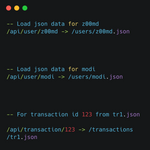
Creating simple mock server using nodejs
When do we need mock server?
Sometimes its not possible to connect to the backend even if you are using a proxy. Having mock-apis in hand just makes UI development easier. Sometimes you need to test your screens for various error scenarios like 404, 504 etc.
What about json-server?
Well, it all depends on your use case. If your app follows rest principles and api calls are structured accordingly, you can always just directly spawn a new instance of json-server and it should be sufficient.
But in practice, what you need is
- Lightweight server which should not need build/deploy etc
- Should be quick to start/restart so that any file change can be done quickly
- Can load data from files depending on the route
- Can simulate service errors like 400, 403, 500 etc
- Should be de-coupled from your dev server
Nodejs http module
Of course you can use any tech stack for the above requirements but generally front-end devs are familiar with Javascript and having a node library for the same makes it a breeze.
- Import the
httpandfs(optional) modules. You can always use simple strings if you don’t want to deal with files.
const http = require("http");
const fs = require("fs");
- Create constants or maybe a separate file altogether
mock-routes.jsonto store the URL to data mapping.
{
"/user-service/user/1234567890": "user/data.json",
"/user-service/user/0987654321": "user/data2.json",
"/role-service/role/manager": "user/manager.json"
}
- Use
createServermethod to create an instance of the server
let routes = JSON.parse(fs.readFileSync("mock-server/mock-routes.json", "utf8"));
const requestListener = function(req, res) {
// Set contentType properly as per need
res.writeHead(200, {"Content-Type": "application/json"});
// Return response
res.end(fs.readFileSync(__dirname + routes[req.url], "utf8"););
};
// pass on the request listener
const server = http.createServer(requestListener);
// set port number as per choice
server.listen(7000);
- Log the routes to standard output for additional debugging
console.log("----- Routes -----");
console.log(routes);
console.log("----- Routes -----");
- If you need custom headers. You can always put this in a conditional statement.
res.setHeader("custom-header", 999999);
- Optional fallback if no route matched
// Read file only if route matched
if (routes[req.url]) {
res.writeHead(200, {"Content-Type": "application/json"});
response = fs.readFileSync(path + routes[req.url], "utf8");
} else {
res.writeHead(404, {"Content-Type": "applciation/json"});
}
- Set content type properly as per the resource if you want to serve data other than json
// For various static resources
if (req.url.includes("fonts")) {
contentType = "application/x-font-ttf";
path = path + "/fonts/";
} else if (req.url.includes("img")) {
contentType = "image/svg+xml";
path = path + "/images/";
} else if (req.url.includes("png")) {
contentType = "image/png";
path = path + "/images/";
} else {
contentType = "application/json";
encoding = "utf8";
}
- Optionally log the hits for troubleshooting
// Output redirection path
console.log("\n", req.url, " -> ", routes[req.url]);
Start the server
node mock-server.js
Output
